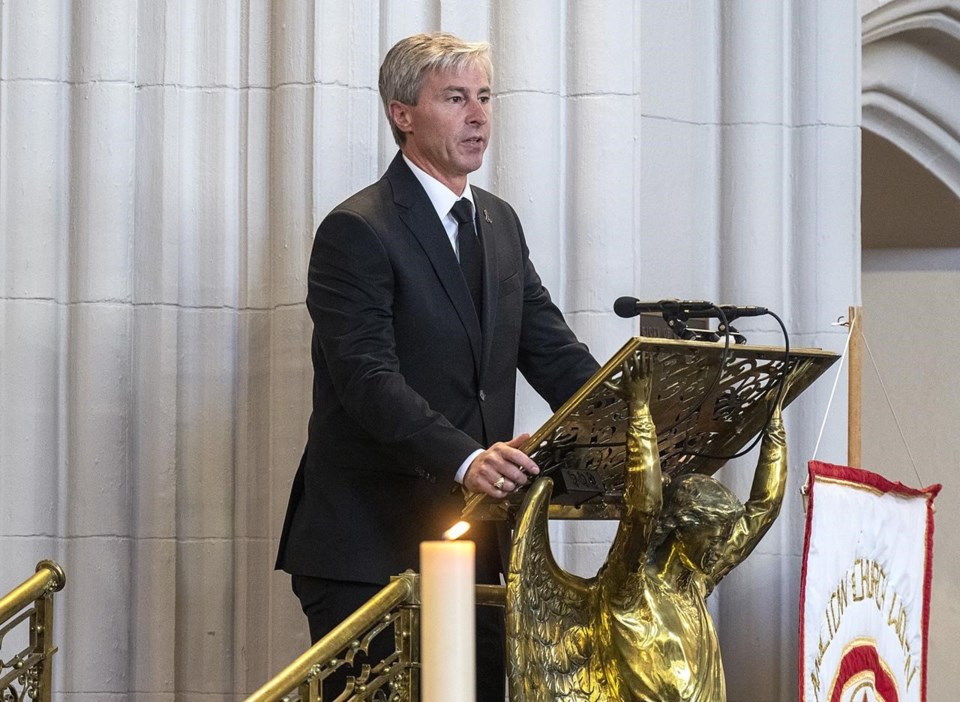HALIFAX — The two host provinces for next month's world junior hockey championship are requiring the sport's governing body to oversee anti-harassment and sexual assault prevention training for all staff and players ahead of the tournament.
Hosts Nova Scotia and New Brunswick also want Hockey Canada to sign an anti-harassment policy, following accusations that the governing body hasn't done enough over the years to address alleged sexual assault involving players.
Nova Scotia Premier Tim Houston says Hockey Canada is reviewing the conditions the host provinces imposed as part of a contribution agreement for the tournament, which begins Dec. 26. Nova Scotia is providing $2 million, and New Brunswick will spend $1.25 million.
“We’ve signed something from our side and sent something to them and we’re just waiting for their response,” Houston said Thursday. “We’ve asked them to take specific steps and we expect them to take them. We’re expecting that everyone is on the same page on this.”
Hockey Canada has faced intense public pressure since May, when it was revealed that an undisclosed settlement had been paid to a woman who alleged in a $3.55-million lawsuit she was sexually assaulted by eight players — including members of the country's world junior team — after a 2018 gala in London, Ont. Allegations of gang sexual assault involving the 2003 world junior team that competed in Halifax emerged in July. None of the allegations have been proven in court.
In an email, the Nova Scotia Department of Communities, Culture and Heritage said the anti-harassment policy makes it clear that there is no tolerance for instances of harassment or abuse at the tournament. “The policy sets standards and expectations for the behaviour of Hockey Canada’s athletes, coaches and staff who will be present for the tournament,” said spokeswoman Mikaela Etchegary.
“The International Ice Hockey Federation management will also undergo training and we would encourage athletes, coaches and staff from other countries to do the same.”
Hockey Canada said in an email that it announced in July that all national team players, coaches and staff would undergo training on sexual violence and consent. The organization said that it also adopted a universal code of conduct last month that all players and staff must sign, adding that any breach could result in a lifetime ban from its programs. As well, all members of Team Canada are required to complete the Coaching Association of Canada’s safe sport training module, the governing body said.
“Team Canada’s security plan for the 2023 IIHF World Junior Championship includes enhanced team rules and increased supervision of players, coaches and staff with a zero-tolerance policy for acts of harassment, discrimination, racism and sexual violence,” Hockey Canada said.
Tammy Scott-Wallace, New Brunswick’s minister of tourism, heritage and culture, said in an email that like Nova Scotia, her province will require every person representing Hockey Canada to sign an anti-harassment policy and to take sexual assault prevention training.
Scott-Wallace said Hockey Canada’s action plan includes training on “masculinity and outdated stereotypes, use of language, consent, bystander awareness and action, building healthy relationships, and other topics covering sexual violence awareness and prevention.”
“My departments … have created a sexual violence prevention campaign, which will run during the training camp and tournament, beginning in early December.”
The province is also talking to Hockey Canada about ways money can be raised from raffle ticket sales to support organizations working to prevent sexual violence in sport.
This report by The Canadian Press was first published Nov. 25, 2022.
Keith Doucette, The Canadian Press
